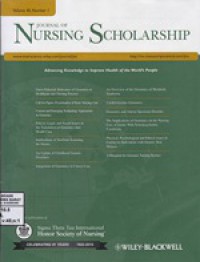
Jurnal
The Effect of Postinjury Depression on Quality of Life following Minor Injury
Purpose: To describe quality of life (QoL) in the year following minor injury and to test the hypothesis that individuals with depression in the postinjury year experience lower QoL than do individuals with no depression.
Design: Prospective, longitudinal, cohort design. A total of 275 adults were randomly selected from injured patients presenting to an urban emergency department.
Methods: All participants underwent structured psychiatric diagnostic interviews immediately after injury and at 3, 6, and 12 months. The primary outcome, QoL, was measured using the Quality of Life Index. Covariates included demographics, injury status, preinjury functional status, preinjury social support, and anticipation of problems postdischarge. The General Estimating Equation was used to compare changes in QoL between participants with and without depression over 3, 6, and 12 months, adjusting for covariates. Results: An 18.1% proportion (95% confidence interval [CI] 13.3, 22.9%) of the sample met criteria for a mood disorder in the postinjury year. The depressed group reported a QoL that was 4.2 points (95% CI 2.8–5.6) lower in the year postinjury compared with that of the nondepressed group.
Conclusions: Depression after minor injury negatively affects QoL even a full year postinjury.
Clinical Relevance: The findings of this study show that patients who have injuries that are treated and discharged from an emergency department can have significantly lower QoL in the year after that injury that is attributed, in part, to postinjury depression. Nurses should provide anticipatory guidance to patients that they may experience feelings of sadness or being “blue,” and that if they do, they should seek care.
Availability
No copy data
Detail Information
- Series Title
-
Journal of Nursing Scholarship, Volume 46, Number 2 March 2014
- Call Number
-
(05) 610.5 WIL j
- Publisher
- Malden : Wiley-Blackwell., 2014
- Collation
-
Hlm. 116-124
- Language
-
English
- ISBN/ISSN
-
1527-6546
- Classification
-
(05) 610.5 WIL j
- Content Type
-
-
- Media Type
-
-
- Carrier Type
-
-
- Edition
-
Volume 46, Number 2
- Subject(s)
- Specific Detail Info
-
-
- Statement of Responsibility
-
-
Other version/related
No other version available
File Attachment
Comments
You must be logged in to post a comment
 Computer Science, Information & General Works
Computer Science, Information & General Works  Philosophy & Psychology
Philosophy & Psychology  Religion
Religion  Social Sciences
Social Sciences  Language
Language  Pure Science
Pure Science  Applied Sciences
Applied Sciences  Art & Recreation
Art & Recreation  Literature
Literature  History & Geography
History & Geography